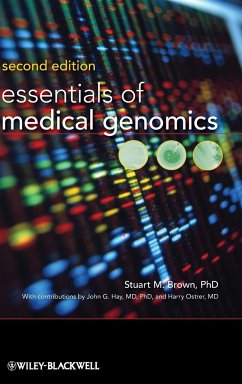Nicht lieferbar

Genetic Effects on Environmental Vulnerability to Disease
Versandkostenfrei!
Nicht lieferbar
While much research has attempted to show direct linear relations between genes and disorder, scientists have been discouraged by inconsistent findings based on this simple gene-phenotype approach. An alternative approach is to incorporate information about the environment. The gene-environment interaction approach focuses on the circumstances in which there is an environmental determinant of disease but where genes influence susceptibility to that environmental factor.Genetic Effects on Environmental Vulnerability to Disease is based on the final meeting of the Novartis Foundation Symposium S...
While much research has attempted to show direct linear relations between genes and disorder, scientists have been discouraged by inconsistent findings based on this simple gene-phenotype approach. An alternative approach is to incorporate information about the environment. The gene-environment interaction approach focuses on the circumstances in which there is an environmental determinant of disease but where genes influence susceptibility to that environmental factor.
Genetic Effects on Environmental Vulnerability to Disease is based on the final meeting of the Novartis Foundation Symposium Series (#293 Understanding How Gene Environment Interactions Work to Predict Disorder). Contributions from geneticists, physicians, oncologists, biologists, statisticians, epidemiologists, psychiatrists and psychologists address:
_ how physiological (mechanistic) measures can be better integrated into epidemiological cohort studies
_ how best to characterise subjects' vulnerability versus resilience by moving beyond genetic main effects
_ how gene hunters can benefit from recruiting samples selected for known exposures
_ how environmental pathogens can be used as tools for gene hunting
_ how to deal with potential spurious (statistical) interactions, and
_ how genes can help explain fundamental demographic properties of disorders such as sex distribution or age effects.
Interwoven with transcripts of the lively discussions among researchers, the contents of the book offer a cutting-edge review of the methodological issues prevailing in this complex, multi-disciplinary field.
A glossary of technical terms helps facilitate understanding across the different disciplines involved, and Sir Michael Rutter's introduction and concluding remarks contribute to presenting scientific issues in an interesting, easily accessible manner.
This book will be of interest to epidemiologist, geneticists, developmental biologists, and researchers in psychiatric disorders, obesity, diabetes, cancer, respiratory diseases and cardiovascular disease
Genetic Effects on Environmental Vulnerability to Disease is based on the final meeting of the Novartis Foundation Symposium Series (#293 Understanding How Gene Environment Interactions Work to Predict Disorder). Contributions from geneticists, physicians, oncologists, biologists, statisticians, epidemiologists, psychiatrists and psychologists address:
_ how physiological (mechanistic) measures can be better integrated into epidemiological cohort studies
_ how best to characterise subjects' vulnerability versus resilience by moving beyond genetic main effects
_ how gene hunters can benefit from recruiting samples selected for known exposures
_ how environmental pathogens can be used as tools for gene hunting
_ how to deal with potential spurious (statistical) interactions, and
_ how genes can help explain fundamental demographic properties of disorders such as sex distribution or age effects.
Interwoven with transcripts of the lively discussions among researchers, the contents of the book offer a cutting-edge review of the methodological issues prevailing in this complex, multi-disciplinary field.
A glossary of technical terms helps facilitate understanding across the different disciplines involved, and Sir Michael Rutter's introduction and concluding remarks contribute to presenting scientific issues in an interesting, easily accessible manner.
This book will be of interest to epidemiologist, geneticists, developmental biologists, and researchers in psychiatric disorders, obesity, diabetes, cancer, respiratory diseases and cardiovascular disease













